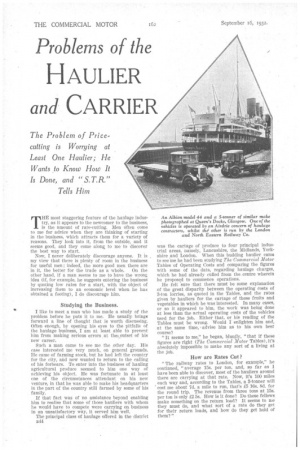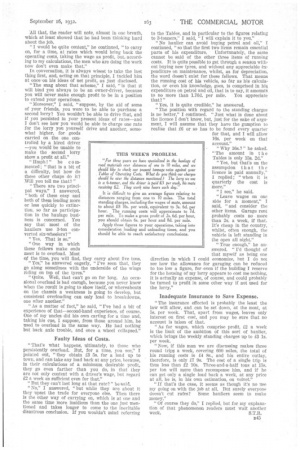Problems of the
Page 70

Page 71

If you've noticed an error in this article please click here to report it so we can fix it.
HAULIER
and CARRIER THE most staggering feature of the haulage industry, as it appears to the newcomer to the business, is the amount of rate-cutting. Men often come to me for advice when they are thinking of starting in the business, which attracts them for a variety of reasons. They look into it, from the outside, and it seems good, and they come along to me to discover the best way to start.
Now, I never deliberately discourage anyone. It is my view that there is plenty of room in the business for useful men ; indeed, the more good men there are
in it, the better for the trade as a whole. On the other hand, if a man seems to me to have the wrong idea (if, for example, lie suggests entering the business by quoting low rates for a start, with the object of increasing them to an economic level when he ha8 obtained a footing), I do discourage him.
Studying the Business.
I like to meet a man who has made a study of the problem before he puts it to me. He usually brings forward a line of thought that is worth discussing. Often enough, by opening his eyes to the pitfalls of the haulage business, I am at least able to prevent him from making serious errors at thek,outset of his new career.
Such a man came to see me the .other day. His ease interested me very much, on general grounds. He came of farming stock, but he had left the country for the city, and now wanted to return to the calling of his forbears. To enter into the business of hauling agricultural produce seemed to him one way of achieving his object. He was fortunate in at least one of the circumstances attendant on his new venture, in that he was able to make his headquarters in the part of the country still farmed by some of his family.
If that fact was of no assistance beyond enabling him to realise that some of those hauliers with whom he would have to compete were carrying on business in an unsatisfactory way, it served him well.
The principal class of haulage offered in the district B44 was the •cartage of produce to four principal industrial areas, namely, Lancashire, the Midlands, Yorkshire and London. When this budding haulier came to see me he had been studying The Commercial Motor Tables of Operating Costs and comparing the figures with some of the data, regarding haulage charges, which he had already culled from the centre wherein he proposed to commence operations. He felt sure that there must be some explanation of the great disparity between the operating costs of 3-ton lorries, as quoted in the Tables, and the rates given by hauliers for the cartage of these fruits and vegetables in which he was interested. In many eases, or so it appeared to him, the work was being done at less than the actual operating costs of the vehicles used for the job. Either that, or his reading of the Tables must be wrong. Would I enlighten him and, at the same time, advise him as to his own best course?
"It seems to me," he began, bluntly, "that if these figures are right (The Commercial Motor Tables), it's absolutely impossible to make any sort of a living at the job.
How are Rates Cut ?
"The railway rates to London, for example," he continued, "average 15s. per ton, and, so far as I have been able to discover, most of the hauliers around there are carrying at that rate. Now, it's 100 miles each way and, according to the Tables, a 3-tormer will cost me about 7d. a mile to run, that's £.5 Ms. 8d. for the round trip. The revenue from three tons at 15s. per ton is only £2 Sc. How is it done? Do these fellows make something on the return load? It seems to me they must do, and what sort of a rate do they get for their return loads, and how do they get hold of them?"'
All that, the reader will note, almost in one breath, which at least showed that he had been thinking hard about the job.
"I would be quite content," he continued, "to carry on, for a time, at rates which would bring back the operating costs, taking the wage as profit, but,-according to my calculations, the men who are doing the work now don't even make that."
In conversation, it is always wisest to take the last thing first, and, acting on that principle, I tackled him at once 'on his ideas of net profit, as just disclosed.
"The snag about that scheme," I said, "is that it will bind you always to be an owner-driver, -because you will never make enough profit to be in a position to extend your operations.
"Moreover," I said, "suppose, by the aid of some of your friends, you were to be able to purchase a second lorry? You wouldn't be able to drive that, and if you persisted in your present ideas of rates—and I don't see how you would be able to charge one rate for the lorry you yourself drive and another, somewhat higher, for goods carried on the one controlled by a hired driver —you would be unable to make the second lorry show a profit at all."
" Huaph " he c o mented ; "that is a bit of a difficulty, but how do these other chaps do it? Will you tell me that?"
"There are two principal ways." I answered, "both of them easy and both of them leading more or less quickly to extinction, so far as participation in the haulage business is concerned. You say that most of the hauliers use 3-ton converted six-wheelers?"
"Yes. That is so."
" One way in which these fellows make ends meet is to overload. Most off the time, you will find, they carry about five tons.
"Yes," he answered eagerly, "I've seen that, they go along sometimes with the underside of the wings riding on top of the tyres."
"Quite. Well, that can't go on for long. An occasional overload is bad enough, because you never know when the result is going to show itself, or whereabouts on the chassis a weakness is going to develop, but consistent overloading can only lead to breakdowns, one after another."
"As a matter of fact," he said, "I've had a bit of experience of that—second-hand experience, of course. One of my uncles did his own carting for a time and, taking his cue, I suppose, from those around him, he used to overload in the same way. He had nothing but back axle trouble, and once a wheel collapsed."
Faulty Ideas of Costs.
"That's what happens, ultimately, to those who persistently overload. But, for •a time, you see," I pointed out, " they obtain a 5s. for a load up to town, and can take any load back at any price, because, in their calculations of a MiDinrattl, desirable profit, they go even farther than you do, in that they are not only content with a driver's wage, but regard £2 a week as sufficient even for that."
"But they can't last long at that rate?" be said.
"No," I answered, "but while they are about it they 'upset the trade for everyone else. Then there is the other way of carrying on, which is at one and the same time more insidious than the one just mentioned and takes longer to come to the inevitable disastrous conclusion. If you wouldn't mind referring to the Tables, and in particular to the figures relating to 3-tonners," I said, "I will explain it to you." .
"No haulier can avoid buying petrol and oil," I continued, "so that the first two items remain essential parts of his expenditure. Unfortunately, the same cannot be said of the other three items of running costs. It is quite possible to get through a season without buying new tyres, and without any appreciable expenditure on maintenance, whilst, as for depreciation, the word doesn't exist for these fellows. That means the running cost of his vehicle, so far as his calculation, or even his knowledge, goes, is comprised in his expenditure on petrol and oil, that is to say, it amounts to no more than 1.76th per mile. You appreciate that?"
"Yes, it is quite credible," he answered.
"The position with regard to the standing charges is no better," I continued. "Just what is done about the licence I don't know, but, just for the sake of argument, I will assume that they have the gumption to realise that £6 or so has to be found every quarter for that, and I will allow 16s. per week on that account."
"Why 16s.?" he asked. "The amount in t he Tables is only 15s. 2d."
"Yes, but that's on the assumption that the licence is paid annually." I replied ; "when it is quarterly the cost is more."
"I see," he said.
"Leave wages on one Side for a moment," I said, "and consider the other items. Garage rent probably costs no more than 2s. a week, if that. It's cheap in the country, whilst, often enough, the vehicle is left standing in the open all night."
"True enough," he answered. "I'd thought of that myself as being one direction in which I could economize, but I do not see how the allowance for garaging can be reduced to too low a figure, for even if the building I reserve for the housing of my lorry appears to cost me nothing, it is actually an expense, of course, and could probably be turned to profit in some other way if not used for the lorry."
Inadequate Insurance to Save Expense.
"The insurance effected is probably the least the law will allow, and. can be set down, at the most, at 5s. per week. That, apart from wages, leaves only interest on first cost, and you may be sure that no account is taken of that.
"As for wages, which comprise profit, 12 a week is the limit of the ambition of this sort of haulier, which brings the weekly standing charges up to £3 1s. per week.
"Now, if this man we are discussing makes three round trips a week, covering 600 miles, the total of his running costs is E4 8s., and his entire outlay, therefore, Is only £7 Os. The cost of a single trip is thus less than £2 10s. Three-and-a-half tons at 15s. per ton will more than recompense him, and if he can get only a single load back a week, at any price at all, he is, in his own estimation, on velvet."
"If that's the case, it seems as though it's no use my going on with the job at all. But surely everyone doesn't cut rates? Some hauliers seem to make money."
"Of course they do," I replied, but for my explanation of that phenomenon readers must wait another week. S.T.R.












































































































